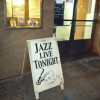One night in the “60s, pianist Mike Longo and his trio were playing between Dizzy Gillespie's sets at the Embers, a now defunct supper club on New York's East Side. During Longo's set Gillespie watched from the audience. He had seen the young pianist play before, and even mentioned him as an up and coming musician in an interview. “He looked up at me and he mouthed the words 'I love you',” Longo recalled.
The musical and personal relationship lasted 27 years, nine of which Longo shared the stage with Gillespie as his pianist and musical director. Their families were very close (Longo was a pallbearer at Gillespie's wife Lorraine's funeral last month), and he was at Gillespie's side the night before he died. “I went to the hospital, it was the last time he was conscious,” he recalled. “Dizzy looked up at us and” (Longo put his finger to his lips, and blew out his cheeks)”.
The relationship didn't end there. 11 years after Gillespie's death Longo named a music venue for him, The John Birks Gillespie Auditorium. Located on an unassuming block of 11th street between University Place and Seventh Avenue, the theater is a cool, air-conditioned haven in summer, and a cozy respite in winter. Regardless of the season, there's always high quality music happening, provided it's Tuesday.
What's unique about the venue is musicians rent the 140-seat space for $75. They must have a CD that is distributed to major outlets, and have had played a major concert or festival. Tickets cost $15, $10 for students, musicians take all the profit. There are two sets. One at eight, and one at ten.
“It's a win/win situation,” said Longo who established “Jazz Tuesdays at The John Birks Gillespie Auditorium” January 6, the anniversary of Gillespie's death. “It provides musicians a space to rent for a nominal fee where they can play their music with no outside interferences, meaning they can play what they want when they want. It gives them the opportunity to play in a drug and alcohol free theater, sharpen their entrepreneurial skills, and it allows the public, and young people to experience world class jazz.”
Longo got the idea to start a jazz series after many young people started showing up at his band The New York State Of The Art Jazz Ensemble's rehearsals. The group had been playing clubs like Birdland that are generally too expensive for young people to frequent. So he started thinking about places where he could play, charge a small fee, and people could go hear his band. The Baha'i Center came to mind.
“Dizzy and I are both Baha”is,” he said of the religion he encountered during the civil rights movement in the “60s. The essence of the faith is based on the unity of humankind, the elimination of racism, the equality of the sexes, and world peace. So it was natural that Longo would name the theater for his friend.
“I remember Dizzy said once, “My music is about absolute love for every man, woman, child, gay, and lesbian on the planet” and that's essentially what the Baha”i philosophy is as well,” Longo said.
In adherence to Baha'i, the series features a mix of races, sexes and ages. Last April 25-year-old saxophonist Joseph Perez played with Charli Persip's big band Supersound, two months later he had his own gig. “Ages range from 24 to 70 in my band,” Longo said. “It's providing young musicians a chance to play with the veterans and learn from them, at the same time the veterans get a kick in the butt by youthful exuberance.”
The series doesn't focus on any particular style of jazz. “There's music that has a cerebral vibe to it, and music that has a primitive appeal to it, and music that has a metaphysical appeal to it. We”re trying to have music that has all of that,” Longo explained. 'so far we”ve been successful. People leave with the feeling that they”ve gotten a full meal - music that makes you think, makes you feel like dancing, and makes you feel uplifted.”
As a nonprofit organization, the series depends on volunteers to survive. The 75 dollar rental fee barely covers the electric bill and meager advertising. Longo hired a publicist, but Angelo Sandy, a professional sound and lights guy volunteers his time. As do seven to ten people from the Baha'i community each Tuesday night. One checks coats in the winter, one sells tickets, some work the CD table, some usher, and some help with break down and clean up. It's a communal effort and Longo would like people in the community to start thinking of Jazz Tuesdays as a regular event. He said that people have been returning because they really enjoy it. “It's about creating music that fills the listener with absolute joy and happiness. That's the kind of music we want to book here.”
From a musical and audience standpoint, Longo said every concert so far has been a success. People “cheered and screamed” for his big band, and left “with a glow on their faces.” “Musicians have been blown away by the vibe here,” he said. “It's like a love-in type of thing. The music has been superb, very inspired.”
show less










